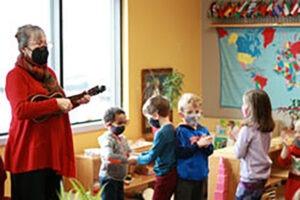 Montessori education is a unique way for children to learn that focuses on independence, freedom within limits, and learning by doing. Music is a big part of the Montessori curriculum for a child’s mental, emotional, and social growth, which helps them excel in other subjects. In this blog, we will discuss the role music plays in Montessori education.
Montessori education is a unique way for children to learn that focuses on independence, freedom within limits, and learning by doing. Music is a big part of the Montessori curriculum for a child’s mental, emotional, and social growth, which helps them excel in other subjects. In this blog, we will discuss the role music plays in Montessori education.
Helps Engage Children in Learning
Music is a fantastic way to make learning fun and engaging for young children. The playful nature of music can help create an enjoyable learning environment. Music makes learning enjoyable for young children because it is active and captures their attention.
Playing instruments also helps children develop fine motor skills and hand-eye coordination. Teamwork, coordination, and listening are crucial when they play music together, and these skills are transferable to other group activities.
Improves Academic Achievement
Studies have shown that learning music improves your memory, focus, and language skills, which helps you to excel better in other classes. Children have naturally creative minds, and creativity, along with critical thinking and problem-solving, can be improved with the help of music education. When kids make music, they think better, get along better with other people, and do better overall in school.
Music in the classroom makes it a more fun and exciting place to learn, and students are more interested in school when it is more fun and rewarding. Music in the classroom also fosters a calm and friendly atmosphere, which makes it easier for kids to concentrate and pay attention. Such an environment is safe and helps improve cognitive skills, emotional intelligence, creativity, and social skills.
Boosts Child’s Spatial Skills
Spatial skills include being able to see and move things in your mind as well as understand and control the real world. Learning music improves the spatial-temporal skills needed to understand and change how space works. In Montessori education, music is often a large part of activities, such as playing an instrument or dancing, which causes you to be more mindful about space.
When children do these things, they learn more about space and time so they can better understand and change how things are set up. You will spot patterns and symbols as you learn to read and play music, which requires you to be more concerned with space, which is a skill that can be applied in other areas like math.
Music makes learning fun and exciting, and kids are more likely to explore and play with their surroundings when they’ve explored musical expression.
Enhance Language Development
Young children can improve their phonetic and phonemic awareness by learning music. Language and music share things like rhythm, melody, and syntax. When kids listen to music, they improve their vocabulary, syntax, and grammar. Teachers use music, like nursery rhymes and songs, in Montessori activities and lessons to help kids learn about sounds and language in a fun way. Music makes learning about topics fun and helps kids feel more confident when speaking.
Foster Creativity
Music makes kids more creative in a Montessori classroom by giving them opportunities to explore and express themselves. Kids play with different sounds and rhythms, make up their own melodies and lyrics, and show how they feel. In Montessori education, music often plays a role in many activities and lessons, giving kids a chance to use their imaginations.
Kids can write songs, improvise on musical instruments, or work with their friends to perform a musical show. When they make music, kids develop their creativity, imagination, and ability to think outside the box as they find new ways to solve problems. Kids build self-confidence, self-expression, and a sense of who they are through music, which is essential for encouraging creativity.
At Miniapple International Montessori School, we use music as a crucial part of Montessori education because it is an excellent way to help your child’s mental, emotional, and social growth. Contact us and we’ll help you set up a dynamic, exciting learning environment that provides your child the best chance to do well in future educational endeavors.

